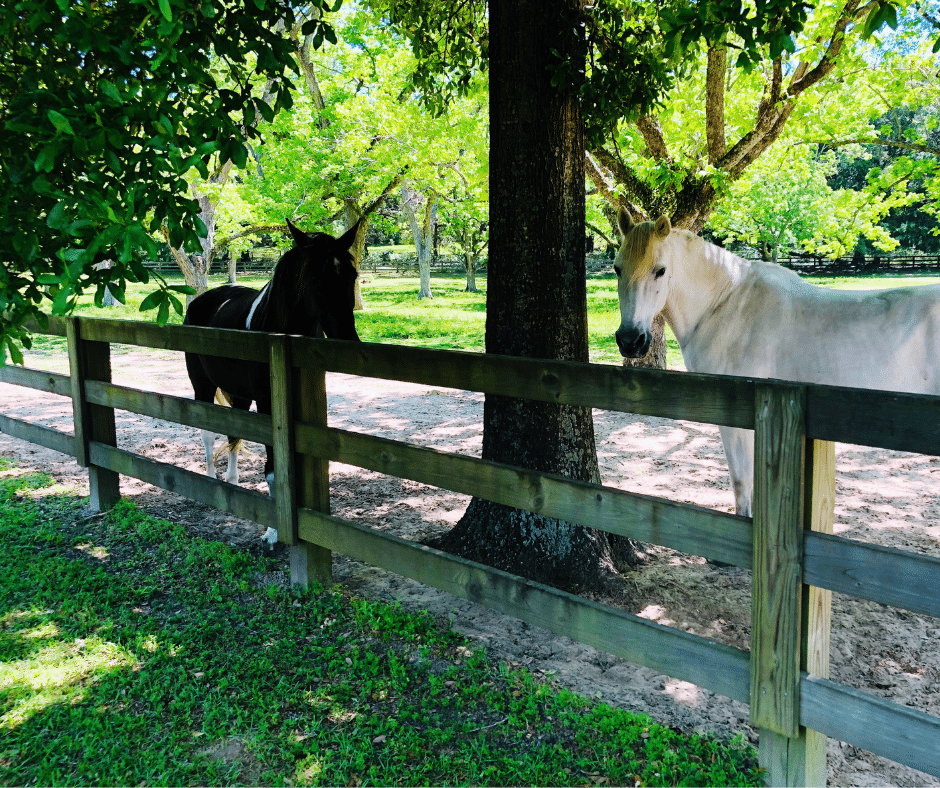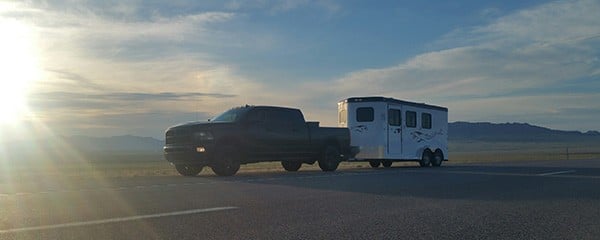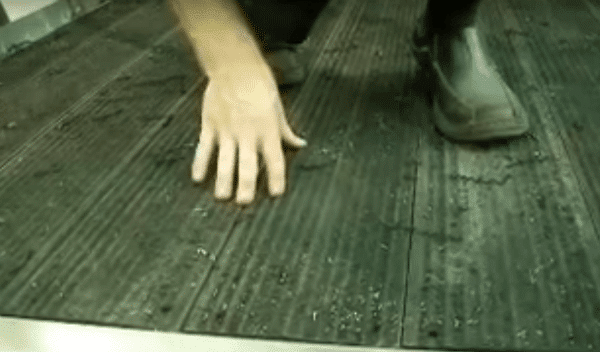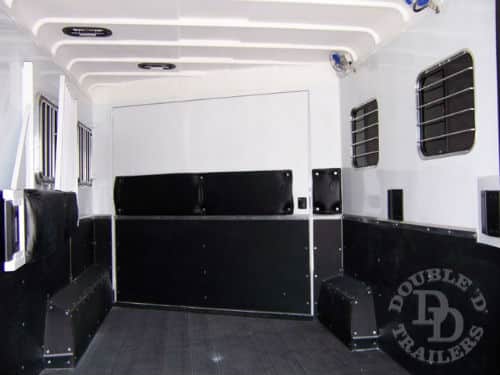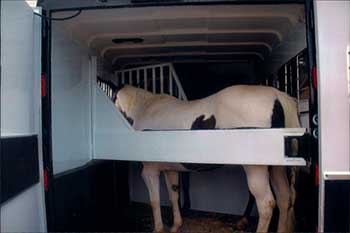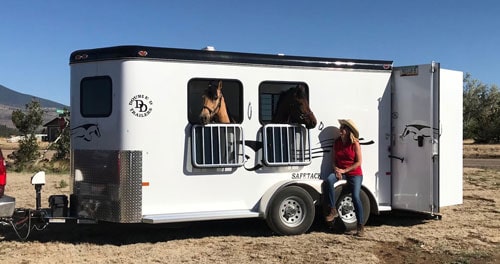Oven-On-Wheels: What Temp is Too Hot for Horses to Be Hauled?
It’s a beautiful summer day and you decide to load up your horses for a day of fun in the neighboring county. A cold drink and blasting air conditioning help you stay cool, but do you consider what temp is too hot for horses in the back of the horse trailer? Are they enjoying the drive like you… or are they baking in a virtual ‘oven on wheels?’
Traveling with your horse in a horse trailer can be dangerous if they become overheated and dehydrated. To get our readers the most accurate and scientifically backed information, we spoke with Dr. Alexandra Tracey DVM, DACVS-LA of Palmetto Equine Veterinary Services in Townville, South Carolina. Dr. Tracey shares with us what you should do to ensure that your horse is safe traveling on these hot summer days.
Hydrating Horses When Hauling in Hot Weather
Dr. Tracey stressed that it is very important to make sure your horse is hydrated even before they step foot on the trailer. She explained, “Before loading your horse for a trip on a hot day, I suggest giving an oral electrolyte supplement.”
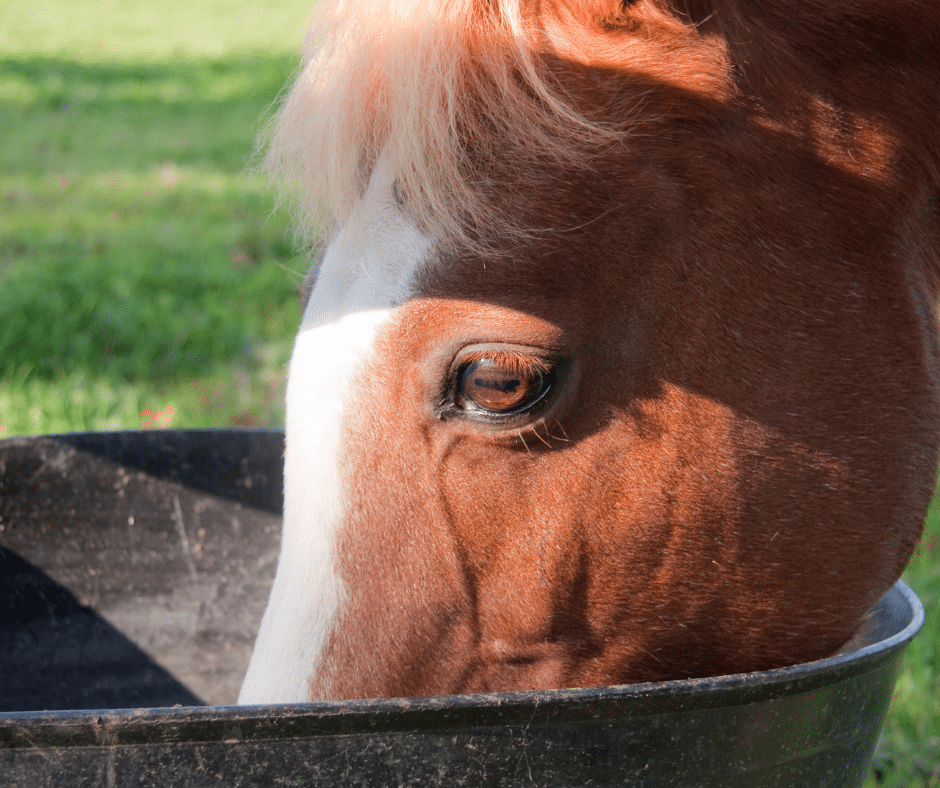
This could be in the form of a gel or a paste and administered similar to a dewormer. Or, you can also find powdered electrolyte supplements that can be placed in a syringe with water and squirted into the horse’s mouth.
“Ideally, the horse will receive electrolytes the night before and the morning of a big trip,” Dr. Tracey continued. “You may also increase your horse’s water intake by wetting his grain ration to make a mash or soup.”
It is possible to add the electrolytes directly to the horse’s feed, but Dr. Tracey does not recommend adding it to their water. Sometimes the ‘off-flavor’ can prevent a horse from wanting to drink. If the horse has two water buckets in their stall, you might try adding the electrolytes to just one of the buckets leaving the other one plain.
Watch Your Horse for Signs of Overheating
Once you are on the road, it is important to keep a careful eye on your horse. According to Dr. Tracey, some of the most common signs of heat distress in horses are:
-
Excessive sweating
-
Flared nostrils
-
Increased respiratory rate
She explained that as the heat stress worsens, the horse would stop sweating and become depressed. Their gums will appear tacky (not moist) and turn a brighter shade of pink than normal. After being pinched, a dehydrated horse’s skin will not spring back. Finally, they likely will not want to drink water once they reach this point of distress.
How to Treat Horses in Heat Distress While Traveling
Once your horse is in distress from the heat, you are going to want to cool them down with a running hose. A blowing fan and shaded area where they can rest will help them cool down as well.
Dr. Tracey added, “Running cool water over the legs, head and neck will help transfer heat from the body to the water which aids in cooling.” The fan will help increase evaporation of water from the horse’s skin.
“Be sure that clean water is available if the horse wants to drink. If the horse does not improve as they are cooled down, please contact the local veterinarian on call to examine and treat the horse.” Remember that early intervention is more effective, faster, and less expensive than letting your horse reach a critical point of heat distress.
Cool your horse down with running water and then let them relax in the shade until their signs of heat distress go away.
So What Temp is TOO Hot for Horses in a Trailer?
Ideally, you would want to avoid any sort of extreme heat distress for your horse. That is why Dr. Tracey recommends avoiding high heat and humidity days over 90 degrees Fahrenheit.
“In the summer, travel should be done as early as possible in the morning to take advantage of the cooler temperatures.”
She went on to explain that gas or refreshment stops should be kept as brief as possible since the trailer heats up the most when air is not flowing steadily. Check your horse at each of these stops and offer water.
She added, “The biggest thing to remember is to keep moving as much as possible to create wind. Avoid routes that take you through high traffic areas that may cause lots of stopping and standing. Do not stop for a full meal if your horses are on the trailer.”
The last thing to consider is the gear that you put on your horse during these hottest of days. Shipping boots and sheets may make your horse hotter in warm weather so you should consider leaving those off if your horse travels calmly. She concluded, “Increasing the airflow in your trailer will also increase the amount of hay and dust moving around. Consider shipping in a fly mask to protect the eyes.”
The Right Horse Trailer Can Help Keep Your Horses Cool
Dr. Tracey prefers trailers with large windows or open sides that provide the best airflow. She does not recommend opening windows directly in front of the horse’s face but any side windows or vents should be opened for maximum airflow.
There are several more features on your trailer that can make a big difference on the interior temperature. First, look for a trailer that has lumber or synthetic ‘rumber’ floors (shown below). Aluminum metal floors can transfer excess heat and vibrations from the road up into your horse’s legs.
Next, avoid trailers that have mill-finished aluminum roofs as they do an excellent job of transferring heat from the sun beating down overhead.
Instead, look for a double layer insulated room that is painted white to reflect heat. The Safebump roofing system from Double D Trailers is ideal because it has one piece of fiber composite material that is leak-proof, insulated, and flexible in case your horse were to rear and bump their head.
While we’re talking about insulation, look at the walls of your trailer. Again, a double layer of materials will prevent temperature build up. Also look for tubular interior dividers that promote airflow and circulation.
Finally, make sure your trailer has large windows that can easily be opened for travel. Pop up roof vents over the heads of each horse will also help the air flow so they can stay cool.
If you keep these tips in mind, you can be sure to have a happy and hydrated horse arrive at your destination.
To learn more about Dr. Alexandra Tracey, visit her practice’s website.
> Keeping your horses cool is a priority both on the road and at home. Find out how a well-designed barn can help maintain a comfortable environment year-round.

